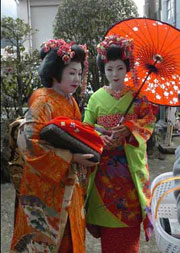|
'Geisha, one of the Best Jobs in Japan'
By Richard Corliss (The Times)
Updated: 2005-12-01 16:33
Ayaka (not her real name) is a thoroughly modern Japanese woman. On her days
off from work, she zips around Tokyo in jeans and a sweater.

Stepping out:
Geisha apprentices take a stroll through
Kyoto | Today, perhaps, she will visit her
favorite museum in the hip Aoyama neighborhood, followed by shopping in the
trendy stores nearby. White iPod earphones hang from her ears. She loves Madonna
and has a lingering fondness for a '70s J-pop act called Pink Lady.
She highly recommends lunch at the swanky Park Hyatt Hotel's delicatessen.
"It is very good value," she says with the matter-of-fact financial savvy common
among single professional women in the world's most expensive city.
But Ayaka is also an anachronism, a century out of step with the times. She
is a geisha, one of perhaps only hundreds left in Tokyo, who are practitioners
of one of Japan's most mysterious and misunderstood female vocations.
But to her, the contrast between the modern and traditional aspects of her
life is no problem. "Being a geisha is one of the best jobs in Japan," she says.
"I hope to be a geisha until I die."
After graduating from college 12 years ago, Ayaka worked briefly as a teller
at a large Japanese bank. "I was so bored," she says. "The thought that this was
what my life was going to be like was unbearable."
Her grandmother had been a geisha, however, as had her aunt and her mother.
Ayaka had always been curious about this world, and through those connections,
she started taking lessons in traditional Japanese music, art and etiquette. She
has been a working geisha for the past six years.
Traditionally, geisha began training as children or in their early teens and
it was virtually impossible to break into the profession as an adult, but
Ayaka's career path is no longer unusual. "These days, there are many of us like
me," she says. "There are a lot of geisha who wanted something different from
being an office lady."
Although some geisha, especially in Kyoto, are still organized into a more
traditional house system with a "mother" in charge, Ayaka lives alone in an
apartment and works as an independent.
A handful of the most exclusive traditional geisha restaurants in town, which
hold large private dinner parties for political potentates and business
grandees, book her services weeks in advance. She generally works four to five
nights per week. Her role, she says, is to help ensure that the guests have a
good time.
The geisha make conversation and witty banter, keep the drinks flowing, and
often perform a traditional Japanese dance or song during the meal. "It is an
art form," Ayaka says. "We see ourselves as keepers of ancient Japanese arts,
culture and tradition."
She thinks, to a degree, that the level of secrecy shrouding the geisha world
is counterproductive, leading to widespread misunderstanding of what she says is
a noble tradition.
This is the reason that she has agreed to talk at length about her job. Too
many people, even in Japan, still think that geisha are high-class prostitutes
or that they are all kept women.
She says it's natural that some geisha may become the girlfriends of clients,
but many don't: "It is all up to the individual." She loves her job (although,
she notes, it does not pay particularly well) because it offers a life in the
arts, the hours are flexible, she is always learning, and she genuinely enjoys
meeting and conversing with the majority of the restaurants' clients.
The profession is modernizing slowly to keep up with changing times. Geisha
have far more say in charting their own careers these days, simple makeup is now
standard at most functions (as opposed to the iconic, shocking-white makeup of
old) and while training is still rigorous, it is not nearly as punishing and
all-consuming as it once was.
Despite her candor, Ayaka doesn't expect the culture of silence and
impenetrability ever to be completely overturned. Indeed, even though she is
happy to talk about her life and her job, she still won't let us print her real
name or take her photograph. "Geisha have to preserve some mystery," she says.
"The aura remains very important."
|